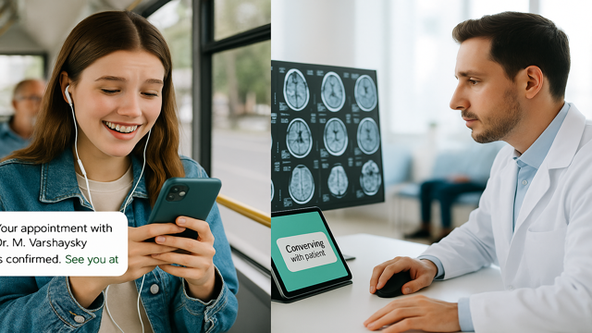The Small Practice Guide to Conversational AI in Healthcare
With breakthroughs in healthcare tech, especially with the use of AI, patients now expect faster and more personalized communication from their...
14 min read
Alvin Amoroso : June 11, 2025

The global healthcare sector stands at a critical juncture. Faced with the immense pressures of an aging population, the rising prevalence of chronic diseases, staggering operational costs, and unprecedented levels of clinician burnout, the traditional models of care delivery are being stretched to their limits. A 2022 study revealed that physician burnout rates have soared to over 60%, a crisis that directly impacts patient safety and care quality. It is within this challenging landscape that a powerful technological evolution is not just emerging, but is actively reshaping the very fabric of medical practice: conversational AI in healthcare. This is not a distant, futuristic concept; it is a present-day force for change, a transformative engine poised to create a more efficient, accessible, and patient-centric ecosystem.
From intelligent, empathetic chatbots providing round-the-clock patient support to sophisticated virtual assistants seamlessly integrated into the clinical workflow, conversational AI healthcare is bridging the communication gaps that have long plagued the industry. By harnessing the power of advanced algorithms, Natural Language Processing (NLP), and machine learning, these systems can understand, interpret, and respond to human language with remarkable acuity. This guide serves as the definitive resource on healthcare conversational AI, providing an exhaustive exploration of its core technologies, its profound and multifaceted benefits, its diverse and innovative use cases, and a detailed look at the exciting and complex future it heralds. We will move beyond the surface-level discussions to provide actionable insights for clinicians, administrators, and patients alike, demonstrating how this technology is becoming an indispensable pillar of modern medicine.
The journey toward the full realization of healthcare conversational AI is ambitious. It is a path paved with significant challenges, including navigating the labyrinthine complexities of data privacy regulations like HIPAA, ensuring robust cybersecurity, and achieving seamless integration with legacy IT systems. However, the sheer momentum of innovation, fueled by a clear and urgent demand for smarter healthcare solutions, is undeniable. This ultimate guide will equip you with a deep understanding of the current landscape, from the granular mechanics of the technology to the high-level strategic considerations for implementation. Whether you are a hospital executive aiming to optimize resource allocation, a physician seeking to reclaim time for patient care, or a patient desiring more control over your health journey, mastering the principles of conversational AI in healthcare is no longer optional—it is essential for navigating the future of medicine.
To truly grasp the transformative potential of conversational AI in healthcare, we must first look under the hood. These intelligent systems are not monolithic; they are a sophisticated symphony of interconnected technologies, each performing a critical function to enable fluid, human-like interaction. Understanding these components reveals the depth and power of healthcare conversational AI.

Natural Language Processing is the undisputed brain of any conversational AI system. It's the advanced branch of AI that empowers machines to decipher, interpret, and generate human language—in all its nuance and complexity. In the high-stakes environment of healthcare, NLP's role is magnified. It's not just about recognizing words; it's about understanding meaning. NLP is further broken down into two critical sub-fields:
If NLP is the brain, machine learning (ML) is the engine that drives continuous improvement and adaptation. An AI model is only as good as the data it's trained on, and ML is the process by which it learns. In the context of conversational AI in healthcare, several types of ML are crucial:
For the growing number of voice-powered conversational AI in healthcare applications, Automatic Speech Recognition (ASR) technology is indispensable. ASR converts spoken language into machine-readable text, enabling hands-free interaction. This is more than just convenience; it's a workflow revolution. However, the clinical environment presents unique challenges that standard ASR systems struggle with:
The strategic implementation of conversational AI in healthcare unleashes a cascade of benefits that ripple across the entire healthcare ecosystem. These advantages move far beyond simple efficiencies, fundamentally enhancing the patient experience, empowering clinicians, and creating more resilient healthcare organizations.

For decades, the patient experience has been fraught with friction—long wait times, confusing instructions, and difficulty accessing information. Conversational AI healthcare directly addresses these pain points, fostering a more empowered and engaged patient population.
The administrative overhead in healthcare is a well-documented crisis, consuming a vast portion of resources and clinician time. Conversational AI healthcare is a powerful antidote, automating and optimizing workflows from the front office to the clinical floor.
Perhaps the most exciting frontier for conversational AI in healthcare is its role as an intelligent partner for clinicians, augmenting their expertise and supporting them in making the best possible decisions.
The theoretical benefits of conversational AI healthcare are materializing into tangible, impactful applications across the entire spectrum of care delivery. These are not just pilot programs; they are scalable solutions being deployed by leading healthcare organizations globally.

One of the most widespread use cases is in front-door patient triage. AI-powered symptom checkers act as a digital welcome mat for healthcare systems.
Medication non-adherence is a multi-billion dollar problem leading to poor clinical outcomes. Conversational AI in healthcare provides a powerful, interactive solution.
Mental health is a perfect storm of high demand, provider shortages, and patient stigma. Conversational AI healthcare is uniquely positioned to help.
Perhaps the most transformative clinical use case is ambient clinical intelligence. This technology aims to make the EHR invisible. An AI-powered device in the exam room listens securely to the natural conversation between a patient and a doctor.

The field of conversational AI in healthcare is advancing at an exponential rate. The applications we see today are just the beginning. As the underlying technologies mature, we are moving toward a future of proactive, predictive, and deeply personalized healthcare.

The future of healthcare conversational AI is not just about reacting to patient queries; it's about anticipating needs.
The Internet of Things is creating a connected ecosystem of smart devices. Conversational AI healthcare will be the central nervous system of this ecosystem.
The next generation of healthcare conversational AI will be emotionally intelligent. It will move beyond understanding words to understanding feelings.
This powerful future cannot be realized without thoughtfully navigating a complex ethical minefield. The responsible development of conversational AI in healthcare is paramount.
AI is already being used in healthcare in numerous ways and its applications will continue to expand. Currently, AI is used for tasks such as medical imaging analysis (e.g., detecting tumors in X-rays and CT scans), drug discovery and development, and predictive analytics to identify patients at risk for certain diseases. The use of conversational AI in healthcare is a prime example of its application in patient engagement, administrative automation, and clinical support. In the future, AI will be even more integrated into clinical workflows, assisting with personalized treatment planning, robotic surgery, and proactive health monitoring through wearable devices. The overarching goal of AI in healthcare is to improve efficiency, accuracy, and patient outcomes.
A classic example of conversational AI is a chatbot on a website that can answer customer questions. In the context of healthcare conversational AI, an example would be a virtual nursing assistant that can interact with patients to check their symptoms, provide medication reminders, and answer basic health questions. Other examples include voice-activated assistants that clinicians can use to dictate notes directly into a patient's electronic health record, or sophisticated chatbots that provide mental health support and counseling. These examples showcase the ability of conversational AI to understand and respond to human language in a way that is both helpful and intuitive.
A primary benefit of conversational artificial intelligence in health care is the significant improvement in patient engagement. By providing 24/7 access to information and support, conversational AI healthcare empowers patients to take a more active role in managing their health. It can answer their questions instantly, provide personalized health tips, and offer reminders for medications and appointments. This constant and accessible support system can lead to better health literacy, improved treatment adherence, and a stronger patient-provider relationship, all of which contribute to better overall health outcomes.
Yes, AI chatbots are increasingly being used in healthcare and are a key component of the broader trend of conversational AI in healthcare. They are deployed for a variety of purposes, including patient triage, where they can assess symptoms and direct patients to the appropriate level of care. They are also used for scheduling appointments, answering frequently asked questions about insurance and billing, and providing medication reminders. In some cases, specialized AI chatbots are even used to provide mental health support and counseling. The use of AI chatbots in healthcare is driven by the need to improve efficiency, reduce administrative burdens, and provide more accessible and responsive care to patients.

With breakthroughs in healthcare tech, especially with the use of AI, patients now expect faster and more personalized communication from their...

In medical practice, HIPAA compliance is non-negotiable. With the rapid adoption of conversational AI, new dimensions are added to the challenge....

Running a modern clinic means managing more than appointments and charts. Patients expect 24/7 answers about refills, bills, and products; teams need...